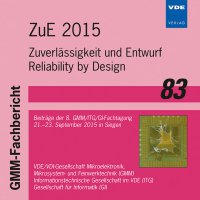Analytical model for ideal generic memristor circuits based on the theory of Volterra
Conference: ZuE 2015 - 8. GMM/ITG/GI-Fachtagung Zuverlässigkeit und Entwurf – Reliability by Design
09/21/2015 - 09/23/2015 at Siegen, Deutschland
Proceedings: ZuE 2015
Pages: 7Language: englishTyp: PDF
Personal VDE Members are entitled to a 10% discount on this title
Authors:
Ascoli, A.; Tetzlaff, R. (Technische Universität Dresden, Mommsenstr. 12, 01062 Dresden, Germany)
Abstract:
The use of memristors in future electronics is under deep investigation nowadays. The fields where these devices may find application are various. In fact there exist distinct types of memristors. Depending upon materials and operating conditions, different physical phenomena may emerge in these two-terminal devices, and the resulting dynamics may exhibit different characteristics. Progress in the investigation of the capabilities of memristors for integrated circuit applications may not leave aside the establishment of solid foundations on the circuit theoretic properties of these devices. Given the nonlinearity characterizing memristors, standard tools for the analysis and synthesis of circuits based upon them may be inappropriate. In this work we present rigorous studies elucidating the applicability of the Volterra series paradigm to model the nonlinear dynamics of a class of circuits with ideal generic memristors. The proposed nonlinear system theoretic approach provides closed-form analytical expressions for currents through all branches and voltages at any node in each circuit within the class. This study extends previous works where application of the Volterra theory was limited to circuits with ideal memristors.


